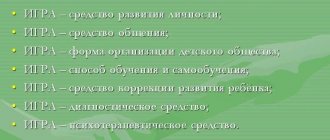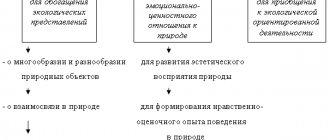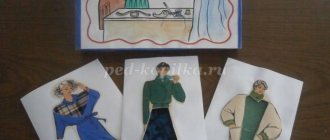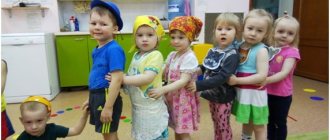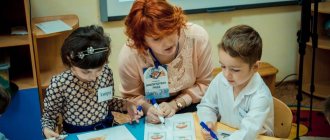The role of didactic games in the development of children of senior preschool age
Bibliographic description:
Vasilyeva, L.N. The role of didactic games in the development of children of senior preschool age / L.N. Vasilyeva, E.A. Dolgopolova, N.A. Saushkina. — Text: direct // Theory and practice of education in the modern world: materials of the XI International. scientific conf. (St. Petersburg, October 2022). - St. Petersburg: Own publishing house, 2022. - P. 1-2. — URL: https://moluch.ru/conf/ped/archive/343/15291/ (access date: 01/25/2022).
The article reveals the possibilities of using didactic games in the developmental space of a kindergarten. Methodological recommendations are given for the use of didactic games with children of senior preschool age, and work experience is described.
Key words: didactic games, preschoolers, development, developmental education, senior preschool age.
The relevance of using didactic games in the development and education of preschool children is due to the fact that games occupy an important place in a child’s life. An increasing number of parents and teachers are interested in the intellectual development of their children. Meanwhile, didactic play is an important means of both the creative development of children and the development of their social skills.
In recent years, issues of the theory and practice of didactic games have been and are being developed by many researchers: L. S. Vygotsky, R. S. Bure, A. N. Leontyev, N. A. Anikeeva, N. Ya. Mikhailenko, G. P. Shchedrovitsky . D. B. Elkonin and others. Domestic and foreign scientists note the importance of using gaming technologies in teaching preschoolers.
Preschool childhood represents the initial stage of personality formation and value orientation in the natural and social world around him. A didactic game, like any educational game, is a type of activity that is organized by a teacher for the purpose of teaching or developing children. Its peculiarity is that it allows you to learn something new, it activates mental processes, and arouses interest in the process of cognition. Didactic games, as V. M. Bukatov notes, are a valuable means of cultivating children’s mental activity. Games promote the development of memory, attention, observation, teach you to apply existing knowledge in new conditions, activate various mental processes, and enrich your vocabulary [Bukatov, 2007].
There are a lot of didactic games, and when organizing them, the age characteristics of children should be taken into account. Games can be included both in direct educational activities and in joint activities with children. Once children learn how to play a particular game, they can play it independently.
In our practice, we use a large number of didactic games. It has been noted that children of older preschool age most like games with a plot. The cognitive task should be presented in an entertaining story: “Today let’s be botanists and examine all the trees on our site. I know that under the poplar we will meet unusual inhabitants. How can we find a poplar? I have a hint: here’s a leaf from this tree.” Next, the children go in search of a poplar tree and find an anthill under it.
Children of older preschool age love to win. It is very important for them to feel successful. In games such as Lotto and Dominoes, as a rule, one person wins. But how can we ensure that all children benefit? In our practice we use chips. As soon as a child wins Zoological Lotto, we invite other children to tell about any animal from his card. As a reward, we give the child a chip. Thus, all preschoolers have the opportunity to feel like a winner.
Let's talk about several new didactic games that we use in our practice.
Game "Intellectual Hockey".
Goal: development of mental abilities and computational skills.
Equipment: plastic board (playing field), on which semicircular areas with numbers (one, three, two), chalk, a puck in the form of a lid, two sticks (two felt-tip pens will do).
Rules of the game. Two people play and take turns hitting the puck with a stick. When the puck lands on a numbered area, it is written down or memorized verbally. The goal of the game is to score as many “goals” as possible. At first we played with children up to ten points. But very soon the children learned to add, and we began to practice mentally counting to twenty.
It was noted that this game encourages children to actively use counting and develop addition skills. Even inactive children began to show a greater desire for mathematical calculations.
Board game "Geologists".
Goal: to develop observation skills, the ability to determine the origin of stones, their properties, useful properties.
Material: stones (chalk, coal, sea pebbles, pieces of granite, marble), playing field with an image of a river, sea, mountain, volcano, cube, chips or figures.
Progress of the game.
A playing field is used on which stones are laid out. Two or three players play. Everyone takes turns rolling the dice.
The teacher says: “Now you and I will be geologists. Who are geologists? They carry out mineral exploration. What minerals are found in the ground? For example, coal, right? Coal is used to heat a house or heat water for houses. And now you go on a journey and look for stones. Roll the dice and count the number of moves. Find a pebble. If you know its name or origin, take it for yourself. The one who collects the most stones wins.
Analysis of the game showed that all children liked the interesting plot: “Collect stones as you move along the map.” Some preschoolers reported disappointment at the beginning of the game:
- But I don’t know any stones.
But as they played, the children learned about many interesting stones and their properties.
The preschoolers were interested in winning the game; they happily collected stones from the playing field and placed them next to them. The children competed to get to the volcano. Everyone wanted to touch the frozen foam stone. During subsequent games, the children easily named the stones and placed them in the appropriate areas: sea on the sea, coal on the mountain, etc.
Many preschoolers have a desire to collect a collection of stones. The children began to show us their collections of stones.
An important goal of the didactic game is to ensure the development of the cognitive processes of preschoolers.
To successfully use didactic games in the practice of teaching and educating preschoolers, a number of conditions must be met:
– the teacher must not only explain and monitor the child’s actions in the game or when performing various tasks, but also help him and explain;
– it is important for educators and parents to awaken children’s interest and desire to actively use educational and developmental games;
– didactic games are best organized in small subgroups of preschoolers, taking into account their intellectual abilities;
– it is important to interest children in the game using an unusual plot or didactic material;
– it is important to diversify didactic games by involving the children themselves in inventing them;
– the game should not be too difficult or too simple, it is important that the child feels success in the game;
– adults should definitely listen to children’s impressions about the game, about what they saw and heard during a lesson, on an excursion or a walk.
Didactic games, when skillfully organized and properly guided, are an effective means of developing and educating children of senior preschool age.
Literature:
- Bukatov V. M. Pedagogical sacraments of didactic games. -M.: Education, 2007. - 123 p.
- Udaltsova, E.I. Didactic games in the education and training of preschool children / E.I. Udaltsova. - M., 2008.
- Fedotova A.M. Let’s explore the world around us by playing: plot-based and didactic games for preschoolers. — Moscow: Sphere shopping center, 2015. — 112 p.
Key terms
(automatically generated)
: game, child, didactic game, senior preschool age, playing field, stone, raising children, preschooler, collection of stones, development.
